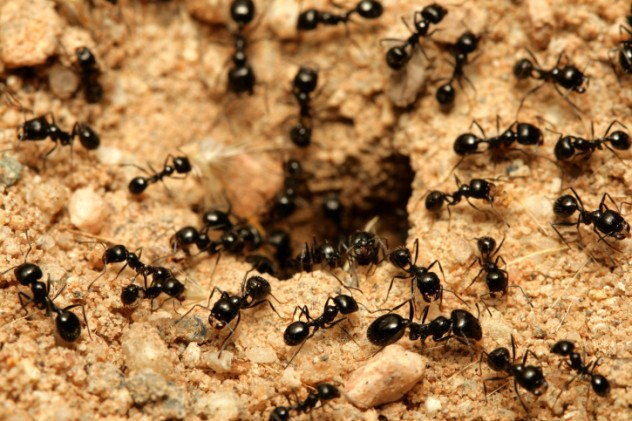Bedbugs
Periplaneta Americana

Ants are one the most successful survivalist insects in our world today. There are thousands of different types of ants all over the world. They are carpenter ants, pavement ants, black ants and citronella ants. Carpenter ants are the only ant that will cause serious structural damage to your home. Other ants may hitch hike up from the south which is not uncommon but will die off during the winter months.
Number wise ants out number humans 1.5 million to 1. All ants start outside in a colony designed for the local environment. They find food such as other insects and water near their colonies or homes. The problem starts when they invade our homes. This happens because all ants forage for food and in doing so communicate with the other ants by means of a pheromone scent, a chemical left behind to tell other members of their colony what they were doing, bringing food back or still looking. If during the foraging one finds a morsel of food they alert the rest of the colony and within a short period of time your can have hundreds of ants in your home.
So what’s the best method in controlling ants in your home? Never letting them in to start with. These are some best practices for keeping ants in general at bay:
There are things you can do outside your home to minimize ant populations close to your home. Instead of piling bark mulch up against your home and over the basement windows scrape some off each year. Bark mulch holds moisture and is a great place for ants to colonize. Make sure the gutters drain away from your foundation. Redirecting rain water is a great way to keep your basement from collecting all the roofs rain water. Ants love shade so keep your shrubs and other items trimmed back away from your foundation and allow the sun to keep the foundation dry.
Treating ants can be very tricky. Depending on the species of ant and the way it reproduces. Incorrectly treated you could end up splitting the colony into fragments and each new fragment will then rebuild to the numbers it was originally.
There are a lot of natural home remedies that include applying cinnamon or peppermint oil around your baseboards and counter tops or coffee grounds around your foundation available online. The best thing to do is use soap and water in areas you are see the first foragers. If they do not make it back to the colony and their pheromone scent is cleaned up you may be able to ward off the invasion of the rest of the colony.
Never use a can of pesticide labeled for ants inside your home, worse yet in your kitchen on the counter top. The best thing to do is contact your local pest management professional such as JEM intercontinental Services and ask for home inspection. They will explain all you options and go over ideas that will change the environment in and around your home so ants will not find it inviting.
Periplaneta Americana